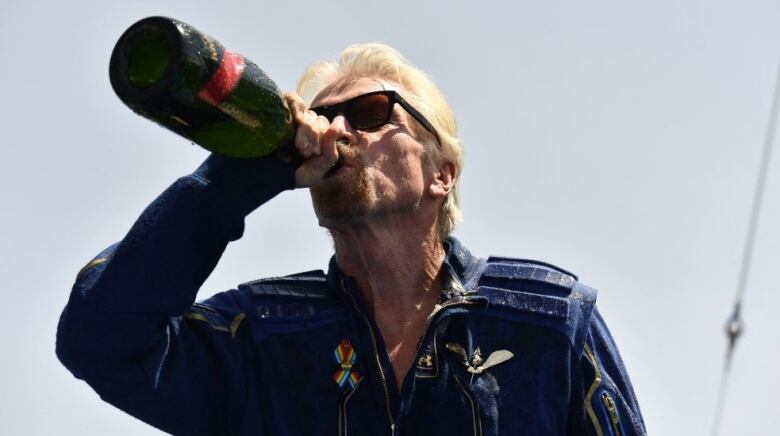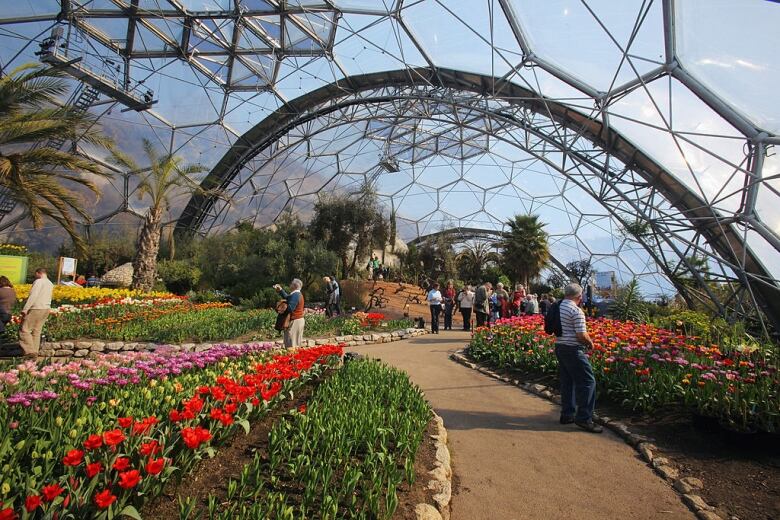Dinner on Mars: How to grow food when humans colonize the red planet
Under the weight of the pandemic lockdowns, food security experts Lenore Newman and Evan Fraser launched a thought experiment. With their research into innovations on Earth, they decided to figure out what it would take to feed a human colony on Mars in 2080.
Both Fraser and Newman drew inspiration from what was already being developed here on planet Earth to envision their Martian colony. From greenhouse technologies to nanotechnologies, they foresee the possibility of a sensible, tasty and balanced diet on Mars – including fine cheeses, scotch and sashimi.
Newman and Fraser are co-authors of Dinner on Mars: The technologies that will feed the Red Planet and transform agriculture on Earth. They agreed IDEAS Host Nahlah Ayed on the lessons they learned to improve our ailing food systems on Earth.
Here is an excerpt from their conversation.
What inspired this whole dinner on Mars thought experiment in the first place?
EF: Well, it was around March 20th, 2020. And I was – like everyone else on the planet – a mixture of fear, anxiety, boredom and fear of this yawning gap opening up in front of me.
As far as I can remember, Lenore, I started texting you and [said], “I think interesting things are happening, but I’m really bored and scared. What do you think?’ And texting every other day turned into 30 or 40 texts an hour and led to a conversation that was essentially, “Well, we can’t physically travel anywhere, but maybe there’s a place we can go in our imagination.” ”
That’s when Richard Branson and Jeff Bezos took off in their rockets — and everyone was talking about space exploration. We thought maybe we should have a silly idea: what would dinner be like if we ever made it to Mars?

At some point, after about six weeks, we realized that this was no longer a stupid exercise. It was dead serious because we were talking about real science, real problems. And then we began to apply the lessons we envisioned on Mars. We began to imagine how they might change the food systems here on Earth. And this is where things got both exciting and serious, as we envision not only how to sustain a new generation of exploration beyond this planet we call home, but also how we must change our diet here on Earth.
Evan, if you don’t mind, paint a picture of how inefficient the global food production system is now.
EF: So right now we have a very paradoxical situation at the level of food security. We have this strange world where both the number of starving and the number of obese are increasing on the planet. So that’s a crazy statistic in and of itself.
And then there are the environmental costs of our food system on a global scale. Food is the most important driver in our losing battle to protect biodiversity. Food is the world’s largest user of freshwater and the largest source of water pollution. Food creates our agri-food systems, creates about a third of the world’s greenhouse gases, and we waste about a third of the world’s food… So when you add all these things together, you think there has to be a more efficient way to do these things. And it’s that kind of feeling, what could the alternative be? That got Lenore and I to think, “Well, if we envision a food system on Mars, maybe we’ll unlock some solutions here on Earth.”
So I’m convinced of the idea. I envision the scene you create, but how is that even logistically possible, Evan? Describe to me the conditions on Mars that you would have to contend with in establishing this Martian colony?
EF: Well, I mean it’s going to be really hard to support a community on Mars, there’s no question about that. On the one hand, you have virtually no water, and what little water there is is frozen into the regolith — that’s a fancy word for essentially Martian dirt. It’s like permafrost doesn’t have a direct analogy, but let’s imagine there are some water crystals frozen in the ground.
There is carbon dioxide in the atmosphere. There is far too much solar radiation but not enough solar energy because Mars is much farther from the sun than Earth, so there is less heat there. So it gets really cold and you don’t have what are called heat units that plants need to thrive. But you have punishing solar radiation because there isn’t really a strong atmosphere that eliminates the radiation. So you have these wild temperature swings. It’s generally too cold. They have no organics at all. They have very little water and too much radiation, but not enough solar energy. It’s a minor disaster.
You can’t send food to Mars. It’s just too far. You can’t get anything to take away.– Lenore Newman, co-author of
But you have things like carbon dioxide and other basic building blocks of life. So if you’re imagining life on Mars, I think you start with some kind of algae or cyanobacteria that can eat that regolith, absorb some carbon dioxide, and produce organic matter and oxygen in the process. And if you can start this process in some kind of tank, and scientists on Earth have simulated Martian conditions and have cyanobacteria that eat and thrive in those conditions, well, then you have the basic ingredients to build on in more detail.
Lenore, how bad are things when we have to think about what might happen on Mars to find out how bad it is here at home?
LN: One of the surprises of the pandemic, and one of the less pleasant surprises, was how severe the food problems became and how quickly they did, and that the world food system basically went into crisis and has remained in crisis ever since. And certainly that has had a lot to do with it: the pandemic, the ongoing and worsening climate change and then, of course, war and political dissatisfaction. And what those of us in food and agriculture have realized is that we’ve probably stepped out of the era when food was easy — with “easy” in quotes. But there were definitely 50 years where groceries got cheaper and cheaper and easier and easier to get to the point where many people on earth didn’t have to think twice about it.

I think one of the catalysts for me was Elon Musk, and his discussion of a city on Mars pushed the food aside. Evan and I knew it was actually a big question because you can’t send food to Mars. It’s just too far. You can’t get anything to take away.
We were beginning to see, we thought, that Earth was becoming a lot more like Mars in some ways, like our own snack system breaking down in the middle of winter. And as we did this exercise, we realized that we could solve these problems for an environment where you have no cushion, where there is no natural world to help you. You are actually beginning to solve these problems on Earth as well. And that became the driving theme of the book. Many of the changes you need to make to make nutrition work on Mars would really help us here on Earth too.
Lenore, I heard that you are inspired by a huge greenhouse complex in England called the Eden Project. can you tell me about it
LN: So I went down a very deep rabbit hole about greenhouses. Because the truth is, we don’t just farm out there on earth, we create small environments for our plants. And there have been some very large experiments to try and bring entire ecosystems indoors for various reasons, from fun to scientific experimentation. And one of the ones that inspired me is this series of domes in southern England called the Eden Project, which encloses a series of biomes in an old mining pit.

LN: It is mainly for educational purposes. It’s not really a closed system because they bring in water and air and stuff like that, but it serves to show that you can create these little communities of plants that support each other indoors. And we saw that in the Victorian era. It was very popular to create this type of pleasure domes full of plants and down through history people have been obsessed with growing plants from their own assortments and that often requires greenhouses.
Guests in this episode (in order of appearance):
Lenora Neumann is Director of the Food and Agriculture Institute at the University of the Fraser Valley and Canada Research Chair for Food Security and Environment.
Evan Fraser is Director of the Arrell Food Institute at the University of Guelph.
David Harland is Chief Global Growth Officer at the Eden Project.
Bjorn Orvar is co-founder and CSO at ORF Genetics in Iceland.
Cher sea weather is CEO at Anthesis Provision in Guelph, Ontario.
*Questions and answers have been edited for clarity and length. This episode was produced by Nicola Luksic.